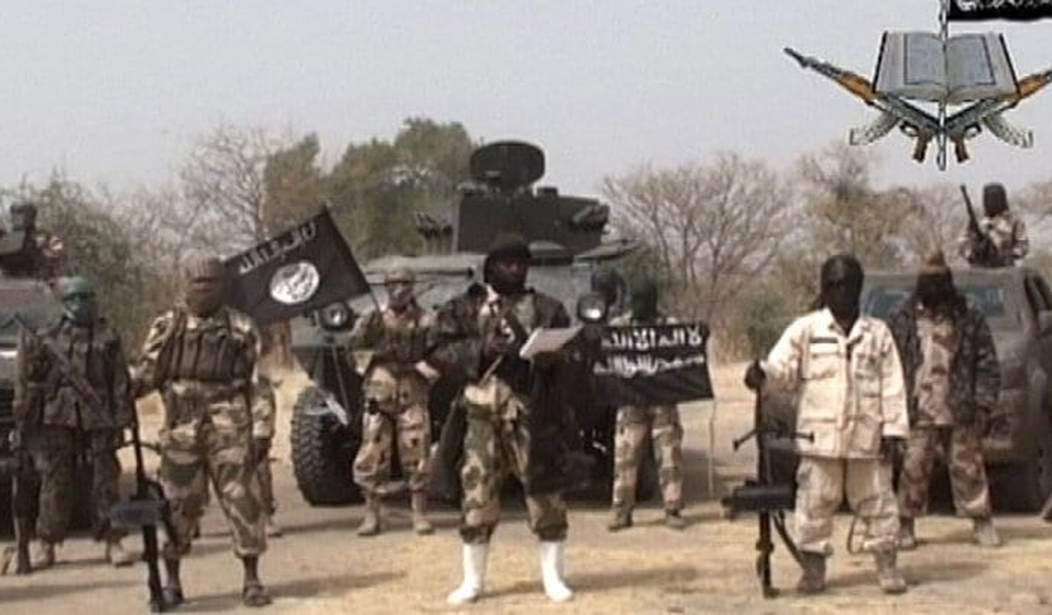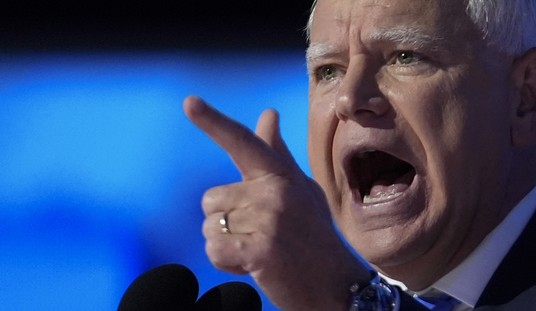WASHINGTON — As the world’s attention is captured by the terrifying determination and bloody modus operandi of the Islamic State, an al-Qaeda affiliate that declared a caliphate last week is sweeping across northeast Nigeria with lightning-quick efficiency and equally brutal means in a bid to break up the most populous nation on the continent.
Boko Haram was on a steady march through Borno state when it overran Gwoza, a city of about 275,000, declaring on Aug. 24 the town now had “nothing to do with Nigeria” — and declaring it “part of the Islamic caliphate.”
Borno state is the region where the kidnapping of Chibok schoolgirls in April touched off the #BringBackOurGirls campaign. The campaign continues in activist circles, but the global attention to the plight of all civilians being terrorized by Boko Haram quickly rose and fell in the scope of a news cycle. At least seven of the girls’ parents have since been killed in Boko Haram attacks.
It’s this inattentiveness from the world community that’s allowing Boko Haram to make such drastic gains while their brothers-in-arms, ISIS, build the Islamic State in Iraq and Syria.
“Boko Haram’s attacks on the people of Nigeria have become more vicious. Their wicked deeds are devastating men, women and children, Christians and Muslims. Everyone is a target for Boko Haram,” Rep. Frederica Wilson (D-Fla.), who has steadily led a daily Twitter campaign for the Chibok schoolgirls, told PJM today.
“Boko Haram has the potential to explode any day, like ISIS. Now we have a major international crisis to deal with in Iraq. The international community must not let this terror continue,” Wilson said.
“We still tweet daily, #BringBackOurGirls, for the safe return of the kidnapped Nigerian schoolgirls. We have a large and supportive following and our purpose is to show the world that Boko is a major threat.”
On the heels of the capture of Gwoza, Boko Haram seized Gamboru Ngala near Lake Chad at the Cameroon border. The terrorist assault was so fierce that, in a historical first for the large West African nation, it drove about 480 Nigerian soldiers into Cameroon. The fight for the strategic location gave Boko Haram a valuable transit point to stock their new caliphate with arms and other necessities.
Boko Haram seized control of Buni Yadi in late August, a city in neighboring Yobe state that signified a westward outpost for the terror group. In February, jihadists slaughtered 59 boys at a boarding school here and torched the educational facilities.
In the first days of September, Boko Haram has gained even more momentum.
The terrorists seized control of Madagli, a town in Adamawa state near the Cameroon border. The Catholic diocese that covers Yobe, Borno and Adamawa states told reporters Thursday that parish priests were fleeing for their lives and churches were being burned to the ground.
“Christian men were caught and beheaded, the women were forced to become Muslims and were taken as wives to the terrorists,” said the diocese statement to the media, according to Nigeria’s Daily Post. “The houses of Christians that have fled are now occupied by the Haramists. Their cars are used by the terrorists. Some Boko Haram sympathizers around the town showed the terrorists Christian homes, and Christians hiding were also identified and killed. Strict Sharia law has been promulgated, as observed by a woman who luckily escaped from the dead zone.”
And the status of Bama, a town in Borno state, was in flux after a Monday assault by Boko Haram, with both the terrorists and government claiming that they held the city. Borno state deputy governor Zanna Mustapha said in a statement, according to Reuters, that the attack “was very unfortunate, but I want to reassure our people that government is on top of the situation.”
The Bama assault put Boko Haram just over 40 miles from Maiduguri, the capital of Borno state with more than a million residents.
Assistant Secretary of State for African Affairs Linda Thomas-Greenfield arrived in Nigeria on Tuesday to attend a regional ministerial meeting on Boko Haram. Before she leaves on Friday, Thomas-Greenfield will sit down with Nigerian government officials to discuss 2015 elections and will meet with alumni from President Obama’s Young African Leaders Initiative, according to the State Department.
State Department press secretary Jen Psaki told reporters today that there were no updates from the Boko Haram meeting.
“I believe that she has been in Nigeria for the past couple of days. And certainly addressing the threat of Boko Haram is a part of those discussions,” Psaki said. “We can see if there’s more of a readout to offer. Sometimes, we deal with time changes and things of that sort.”
The Nigeria Security Network, a collaboration of security experts and academics, issued a chilling report Tuesday that warned of no less than the severing of Nigeria — with Borno state as Boko Haram’s new “country.”
“Boko Haram have hoisted flags over many of the communities they have overrun, and are reported to be imposing their interpretation of sharia law on the population. They have been accused of beheading Christians and carrying out other atrocities in the affected towns and villages,” the report states.
“Nigeria is on the verge of losing control of Borno state, including the state capital Maiduguri. Boko Haram have seized territory along at least two of the main approaches to the capital and are reported to be preparing to strike the city. Their seizure of Dikwa and attacks on Bama could indicate a two-pronged assault from the north-east and the south-east. Attacks from elsewhere also cannot be ruled out. If Maiduguri falls, it will be a symbolic and strategic victory unparalleled so far in the conflict.”
The group called that no less than “the realisation of Boko Haram’s ambition to establish a caliphate in north-east Nigeria.”
In a July video, Boko Haram leader Abubakar Shekau included the Islamic State’s self-proclaimed caliph, Abu Bakr al-Baghdadi, among his “brethren,” as well as al-Qaeda leader Ayman al-Zawahiri and Taliban chief Mullah Omar. Tweets from ISIS-affiliated accounts at the time of Shekau’s caliphate declaration showed appreciation for Boko Haram’s tenacity and tactics.
The Nigeria Security Network report stressed that Boko Haram’s military strategy, including the destruction of key bridges, has hampered the Nigerian military’s response. “If Borno falls to Boko Haram, parts of Yobe and Adamawa can be expected to follow. Parts of Cameroon along the border area would also probably be overrun. Unless swift action is taken, Nigeria could be facing a rapid takeover of a large area of its territory reminiscent of ISIS’s lightning advances in Iraq.”
That would result not only in a humanitarian disaster as civilians flee, but even more atrocities against the populace unable to escape. “Attacks against government workers and others in Maiduguri are very likely should the capital fall,” the report adds.
It marks July as the point when Boko Haram’s advancements entered “a dangerous new phase” — and the point when the terrorists began “to operate like a conventional army.”
While Boko Haram units outside of the northeast continue to stage “hit-and-run assaults” largely for “psychological effect,” in Borno, Adamawa, and Yobe states they are now “aggressively challenging the Nigerian military through direct confrontation in open and sustained battle,” including the reported use of tanks and artillery.
As in Iraq, some government soldiers have fled from Boko Haram assaults. Units lack proper equipment or enough rounds of ammunition to take on the terror group. The report urges immediate reinforcement of Maiduguri to keep the state capital from falling, and urges Cameroonian forces to prepare for a border assault.
The international community, the report recommends, should “consider providing the Nigerian government with non-lethal military assistance, including reconnaissance and transportation” and “continue to facilitate and strengthen regional cooperation to tackle the Boko Haram threat, following agreements reached at the recent conferences in Paris and London.”
Boko Haram began its attacks in 2009 with bombings, assassinations and kidnappings, moving into a guerrilla-style insurgency in 2011. The Obama administration declared Boko Haram a foreign terrorist organization this past November.
The fall of Borno state would give Boko Haram’s regional partners and fellow al-Qaeda affiliates a new place to train, along with whatever foreign fighters want to come join the movement. U.S. Africa Command noted in summer 2012 that al-Qaeda in the Islamic Maghreb was inviting Boko Haram and Somalia’s Al-Shabaab to train in an area the size of Texas controlled in northern Mali.
Boko Haram’s latest mention at a White House briefing was a month ago during the Africa Leaders Summit, which the administration pulled together to focus on economic development opportunities for the continent.
In a speech a year ago at Camp Pendleton President Obama said al-Qaeda has been “decimated” yet “from Yemen to Iraq, from Somalia to North Africa, the threat today is more diffuse.”
“And while we are vigilant for signs that these groups may pose a transnational threat, most are focused on operating in the countries and regions where they are based,” Obama said.
While in D.C. for the leaders’ summit, Somali President Hassan Sheikh Mohamud told PJM that “the risk is always there, everywhere.”
“Boko Haram, Al-Shabaab, all of them, these are terrorist organizations — they are linked, they live for each other, they support each other and they are connected globally,” Mohamud said. “It’s not just an issue of one country or one region — it’s a global phenomenon that needs to be addressed globally.”









Join the conversation as a VIP Member